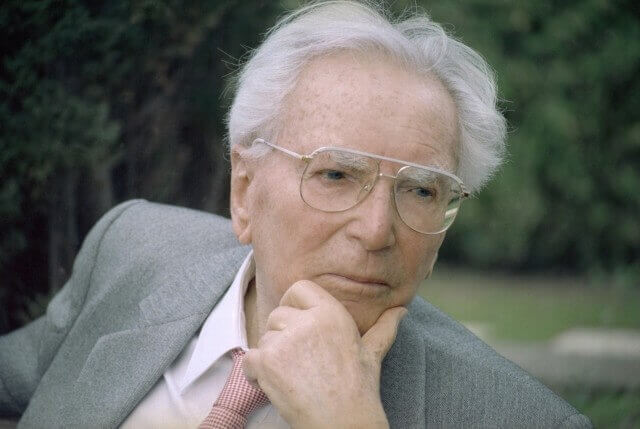Viktor Frankl's Logotherapy: 3 Basic Principles

Logotherapy is also known as “the third Viennese School of Psychotherapy”. The first psychological school was Sigmund Freud’s, the second was Adler’s, and the third is a school founded by Viktor Frankl. That is where we are going to focus on now.
Freud said man was oriented towards “pleasure”. Then, Adler said he was oriented towards “power”. Frankl, however, had a vision of man as being directed towards “meaning”.
Historians of psychology agree that the study of psychoanalysis is also somewhat the study of the life of Freud, its founder. Similarly, we could say that by studying logotherapy, we get closer to understanding the life of Frankl. We can hardly understand the development of the third psychological school without understanding the life history of the person who started it.
I have found the meaning of my life by helping others to find meaning in their lives.
Viktor Frankl
Viktor Emil Frankl was born in Vienna on March 26th, 1905. He survived four concentration camps, including Auschwitz. From an early age he showed an interest in the study of medicine and natural sciences. He also had a very critical spirit towards reductionist positions.
His vocation came very early and his own search for meaning began long before the Holocaust. During the Holocaust, he worked on his best-known book, Man’s Search for Meaning.
Viktor Frankl had a conviction that what makes us unique is the human spirit. Reducing life and human nature to “nothingness”, as many philosophers and psychiatrists of the time did, was not the most appropriate way of looking at life.
Man can keep a vestige of spiritual freedom, of mental independence, even in terrible circumstances of psychological and physical tension.

At 19, he had already developed his two fundamental ideas.
- The first: we must answer the question that life asks about the meaning of our lives, since we are responsible for our existence.
- Second: the ultimate meaning is beyond our comprehension and will remain there. It is something we have to have faith in as we pursue it.
Frankl’s experience in the concentration camps showed him that humans have the capacity to a find meaning. A meaning to any circumstances in life, even the most absurd and painful ones.
Man’s Search for Meaning
In his work, Man’s Search for Meaning, Frankl writes about his experiences in the concentration camps (Turkhein, Kaufering, Theresienstad, and Auschwitz). It describes the abuse that the prisoners endured, but also discusses the beauty of the human spirit. In short, the book is about how to transcend horror and find meaning even in the most terrible circumstances.
Viktor Frankl died on September 2nd, 1997, at the age of 92, leaving behind a great legacy. Through his life and work, he reminds us that we can all create meaning that will save us in difficult moments and will never go away now matter what we do or how uncertain life may be.
Man can be taken away from everything except one thing: the last of the human liberties — the choice of personal attitude to a set of circumstances — the ability to decide his own path.
Logotherapy
As we said, logotherapy is recognized as the third Viennese school of psychotherapy. It made its global debut in the 40’s. Logotherapy is a method of overcoming human conflicts that cause suffering.
It allows us to find meaning in difficult, painful situations. They instead become opportunities for growth. This method allows us to find meaning in all the events of life, making it possible to live a full life.
In logotherapy, logos refers to “meaning”, something humans always seek. Thus, logotherapy means therapy through “meaning”.

The 3 basic principles of logotherapy
The three basic principles or pillars of logotherapy are the following:
- Freedom of will
- Will of meaning
- Sense of life
Freedom of will
Freedom of will unfolds through a specifically human capacity known as “self-distancing”. It is the possibility of seeing, accepting, regulating, and visualizing oneself. According to the teachings of Frankl, it gives us freedom from three sources of influence:
- Instincts
- Heritage
- Environment
Man possesses all three of these things, but they do not determine us. We are not predetermined or finalized. We are free from these three aspects. Whenever humans are liberated from something, it is for a reason. Herein lies the concept of responsibility. Man is free to be responsible and is responsible because he is free.
From this existential analysis, man is responsible for the realization of meaning and values. Man has a call to realize the meaning of his life and the values that give meaning to it. Man is the only one responsible for this call.
Will of meaning
The will of meaning and the self-transcendence that characterizes humans are closely related. Man always points beyond himself, towards a meaning he must first discover and whose fullness he must achieve. The will to pleasure (Freud) and the will to power (Adler), lead man to immanence. However, these concepts oppose self-transcendence and would frustrate our existence.
From the perspective of logotherapy, pleasure and power are consequences of reaching an end, but not the end itself. Hence why people who pursue only pleasure or power live in frustration. They feel pulled into a great existential vacuum. The will to meaning does not seek power or pleasure. It does not even seek happiness. Its focus is the finding of an argument — a reason– to be happy.

Sense of life
The two principles that we mentioned speak of a person willing to take a stand before the circumstances of life, with total freedom, based on a meaning that conveys it. This is the profile of man in search of meaning. Life has meaning. That meaning is unique to each one of us. Thus, our duty as conscious and responsible beings is to discover our own version of this meaning.
Death can only cause dread in those who do not know how to fill the time they are given to live.
We do it through three fundamental channels that refer to three categories of values.
- Sometimes, it directs us to the realization of creative values.
- Other times, it will impact us with an experience. For example, when we witness a sunset or someone holds our hand.
- Other times, we will face the limitations of life itself (death, suffering).
In any case, life will always contain a hidden meaning until the end. It’s a compelling, continual call to discover and realize it. These are the three fundamental principles of Viktor Frankl’s logotherapy. As we’ve seen, it is a humanistic-existential view of humans. And it can be difficult to understand if we’re not familiar with existentialism. However, it’s worth the effort when we think about everything it has to offer our conceptualization of life.
Works cited
V. Frankl (2013). Man’s Search for Meaning. Herder.
V. Frankl (2003). Before the existential vacuum: towards a humanization of psychotherapy. Herder.
Logotherapy is also known as “the third Viennese School of Psychotherapy”. The first psychological school was Sigmund Freud’s, the second was Adler’s, and the third is a school founded by Viktor Frankl. That is where we are going to focus on now.
Freud said man was oriented towards “pleasure”. Then, Adler said he was oriented towards “power”. Frankl, however, had a vision of man as being directed towards “meaning”.
Historians of psychology agree that the study of psychoanalysis is also somewhat the study of the life of Freud, its founder. Similarly, we could say that by studying logotherapy, we get closer to understanding the life of Frankl. We can hardly understand the development of the third psychological school without understanding the life history of the person who started it.
I have found the meaning of my life by helping others to find meaning in their lives.
Viktor Frankl
Viktor Emil Frankl was born in Vienna on March 26th, 1905. He survived four concentration camps, including Auschwitz. From an early age he showed an interest in the study of medicine and natural sciences. He also had a very critical spirit towards reductionist positions.
His vocation came very early and his own search for meaning began long before the Holocaust. During the Holocaust, he worked on his best-known book, Man’s Search for Meaning.
Viktor Frankl had a conviction that what makes us unique is the human spirit. Reducing life and human nature to “nothingness”, as many philosophers and psychiatrists of the time did, was not the most appropriate way of looking at life.
Man can keep a vestige of spiritual freedom, of mental independence, even in terrible circumstances of psychological and physical tension.

At 19, he had already developed his two fundamental ideas.
- The first: we must answer the question that life asks about the meaning of our lives, since we are responsible for our existence.
- Second: the ultimate meaning is beyond our comprehension and will remain there. It is something we have to have faith in as we pursue it.
Frankl’s experience in the concentration camps showed him that humans have the capacity to a find meaning. A meaning to any circumstances in life, even the most absurd and painful ones.
Man’s Search for Meaning
In his work, Man’s Search for Meaning, Frankl writes about his experiences in the concentration camps (Turkhein, Kaufering, Theresienstad, and Auschwitz). It describes the abuse that the prisoners endured, but also discusses the beauty of the human spirit. In short, the book is about how to transcend horror and find meaning even in the most terrible circumstances.
Viktor Frankl died on September 2nd, 1997, at the age of 92, leaving behind a great legacy. Through his life and work, he reminds us that we can all create meaning that will save us in difficult moments and will never go away now matter what we do or how uncertain life may be.
Man can be taken away from everything except one thing: the last of the human liberties — the choice of personal attitude to a set of circumstances — the ability to decide his own path.
Logotherapy
As we said, logotherapy is recognized as the third Viennese school of psychotherapy. It made its global debut in the 40’s. Logotherapy is a method of overcoming human conflicts that cause suffering.
It allows us to find meaning in difficult, painful situations. They instead become opportunities for growth. This method allows us to find meaning in all the events of life, making it possible to live a full life.
In logotherapy, logos refers to “meaning”, something humans always seek. Thus, logotherapy means therapy through “meaning”.

The 3 basic principles of logotherapy
The three basic principles or pillars of logotherapy are the following:
- Freedom of will
- Will of meaning
- Sense of life
Freedom of will
Freedom of will unfolds through a specifically human capacity known as “self-distancing”. It is the possibility of seeing, accepting, regulating, and visualizing oneself. According to the teachings of Frankl, it gives us freedom from three sources of influence:
- Instincts
- Heritage
- Environment
Man possesses all three of these things, but they do not determine us. We are not predetermined or finalized. We are free from these three aspects. Whenever humans are liberated from something, it is for a reason. Herein lies the concept of responsibility. Man is free to be responsible and is responsible because he is free.
From this existential analysis, man is responsible for the realization of meaning and values. Man has a call to realize the meaning of his life and the values that give meaning to it. Man is the only one responsible for this call.
Will of meaning
The will of meaning and the self-transcendence that characterizes humans are closely related. Man always points beyond himself, towards a meaning he must first discover and whose fullness he must achieve. The will to pleasure (Freud) and the will to power (Adler), lead man to immanence. However, these concepts oppose self-transcendence and would frustrate our existence.
From the perspective of logotherapy, pleasure and power are consequences of reaching an end, but not the end itself. Hence why people who pursue only pleasure or power live in frustration. They feel pulled into a great existential vacuum. The will to meaning does not seek power or pleasure. It does not even seek happiness. Its focus is the finding of an argument — a reason– to be happy.

Sense of life
The two principles that we mentioned speak of a person willing to take a stand before the circumstances of life, with total freedom, based on a meaning that conveys it. This is the profile of man in search of meaning. Life has meaning. That meaning is unique to each one of us. Thus, our duty as conscious and responsible beings is to discover our own version of this meaning.
Death can only cause dread in those who do not know how to fill the time they are given to live.
We do it through three fundamental channels that refer to three categories of values.
- Sometimes, it directs us to the realization of creative values.
- Other times, it will impact us with an experience. For example, when we witness a sunset or someone holds our hand.
- Other times, we will face the limitations of life itself (death, suffering).
In any case, life will always contain a hidden meaning until the end. It’s a compelling, continual call to discover and realize it. These are the three fundamental principles of Viktor Frankl’s logotherapy. As we’ve seen, it is a humanistic-existential view of humans. And it can be difficult to understand if we’re not familiar with existentialism. However, it’s worth the effort when we think about everything it has to offer our conceptualization of life.
Works cited
V. Frankl (2013). Man’s Search for Meaning. Herder.
V. Frankl (2003). Before the existential vacuum: towards a humanization of psychotherapy. Herder.
All cited sources were thoroughly reviewed by our team to ensure their quality, reliability, currency, and validity. The bibliography of this article was considered reliable and of academic or scientific accuracy.
V. Frankl (2013). Man’s Search for Meaning. Herder.
V. Frankl (2003). Before the existential vacuum: towards a humanization of psychotherapy. Herder.
This text is provided for informational purposes only and does not replace consultation with a professional. If in doubt, consult your specialist.







